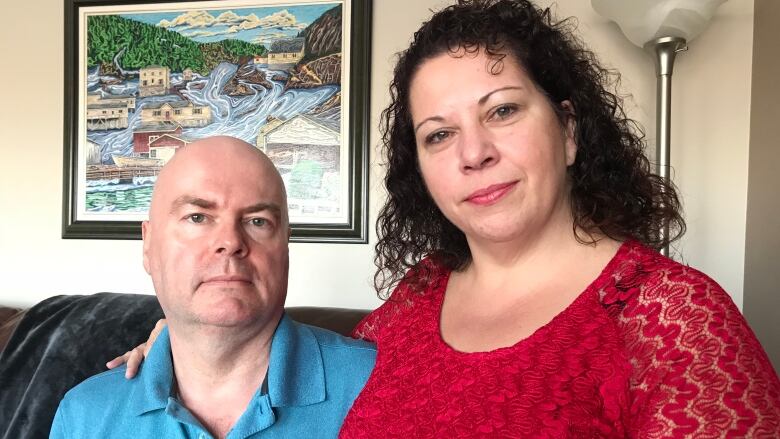Mother of adult with autism calls Alberta's support system 'broken'
Lisa Matthews says mental and physical health problems mean she can no longer care for her son

A Calgary mother says she can no longer take care of her grown son with developmental disabilities, and she's been fighting for years to get the provincially-funded supporthe needs to live on his own.
Lisa Matthews describes her24-year-old son, who has autism, as gentle, artistic and fun-loving.But at sixfeet three inches and 450 pounds, Nicholas Matthews also faces many challenges.
"I'm afraid I'm going to find him dead in his room," she said.
Lisa says her son struggles with depression andan eating addiction, and hespends most of his time in his bedroom working on art projects.
There have been violent outbursts and he has even attempted suicide.
"For 4 years, we've been begging and pleading to get help to get Nicholas living outside of our house."

While they do have funding for help inside their home, the family has been asking the province through its Persons with Developmental Disabilities program (PDD) for a supportive living arrangement so Nicholas can live on his own with some help.
But, according to Lisa, they've been faced with a barrage of setbacks, including high turnover of PDD staff. Nicholas has had six different caseworkers in four years.
"The system is a mess. There's too much turnover. There's too much transition it's broken," she said.
To make matters worse, Lisa and her husband, Art,say they're now struggling withphysical and mental health problems they attribute to chronic stress. Art has heart problems, whichrequired triple bypass surgery a year ago, and Lisa struggles with depression and a health condition that is still being investigated by doctors.
"[I'm] feeling helpless and hopeless because I don't know where we go from here" she said.
Long waits a growing concern
A decade ago, Lyndon Parakin, executive director of Autism Calgary, would hear from one or two families a year in this situation.
He now hears from as many as five families per month.
"Unfortunately it's becoming more common," said Parakin, adding heworries about the toll these long waits for service can take on individuals and their families.
"Sometimes matters get so bad that they're having to go to the hospital to get some help because there's risk of harm to themselves and others," he said.
"It becomes wearing. Your own mental and physical health is at risk," said Parakin.
Parakin says the province needs to create a better way of transitioning people with autism to different types of care and supports as parents age or are no longer able to cope.

Province responds
According to the province, 60 to70 Albertans are currently eligible for, but not receiving services through the PDD program, which is currently under review.
"[It] would not be my experience that things take that long. If the family needs supports, we would be looking to provide supports as soon as possible," said Roxanne Gerbrandt,executive director of the disability services branch with the department of community and social services.
She says four years is not a typicalwait for a supportive living arrangement.
"How long that takes to find a right match can depend person-to-person based on the uniqueness of their needs or even the complexity of their needs," she said.
Other factors can also play a role in wait times, according to Gerbrandt, including specific location requests, requirements that a home be on one level, safety concerns, and finding the right supportive roommate.
"Sometimes we can offer family supports that they may or may not choose to accept," she said.
'I'm done. I'm so tired'
While it won't discuss specific cases, it appears the province has a different account ofhow long Nicholas Matthews has been on the wait list.
In a recent email to Lisa, a government official stressedthe PDD team has been working with the family for just over a year to find a supportive living arrangement and that a possible placement was identified earlier this year, but turned down.
According to Lisa, they were concerned the placement wasn't a good fitand were unable to arrange a time to view the home.
Several hours after CBC News first requested information about theircase,the province contacted Lisaabout two more potential homes, but she says neither worked out and the search continues.
If a home isn't found soonshe says she may consider a drastic step dropping her son off at a police station or PDD office.
"[We] can't continue on the way we've been going. I'm done. I'm so tired," she said.
- Read more articles byCBC Calgary, like us onFacebookfor updates and subscribe to ourCBC Calgary newsletterfor the day's news at a glance












_(720p).jpg)


 OFFICIAL HD MUSIC VIDEO.jpg)
.jpg)



























































































